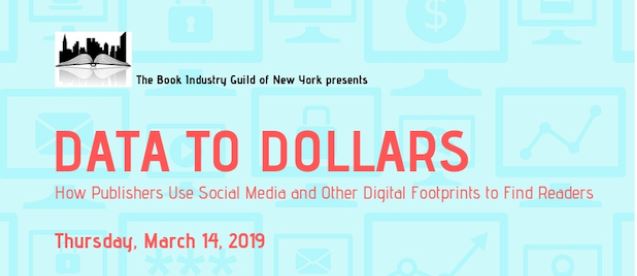BIGNY’s Data to Dollars: How Publishers Use Social Media and Other Digital Footprints to Find Readers
Usually, data scandals don’t inspire publishing industry panels. But on March 14 at the Courtyard by Marriott Central Park, one did. The Book Industry Guild of New York (BIGNY)’s program Data to Dollars: How Publishers Use Social Media and Other Digital Footprints to Find Readers was inspired by the 2018 revelations about Cambridge Analytica’s influence on the 2016 US presidential election.
The revelation about how Facebook users’ data was used without their consent inspired Christa Angelios to put together a panel of publishing industry experts who deal in big data to reflect on how we as an industry use the data we are collecting. As publishing is becoming more data-driven, we need to ask ourselves how to balance the increasing pressure to reach out to readers in a crowded marketplace with concerns about privacy and tracking.

Moderator Jim Lichtenberg of Lightspeed LLC, who was writing about Big Data in publishing when it was just a trend on the horizon, asked the panelists questions about their own data strategies and how those strategies are changing with the rise of GDPR, consumer concerns about privacy, and more.
Erika Seyfried, Director of Content Services in Advertising and Promotion for Random House Publishing Group, described how data insights like the ones Miller provided earlier in the program are driving how she allocates marketing effort and dollars. Because backlist titles have been performing well, Seyfried has started to concentrate more on search marketing. If consumers are reading older titles, it’s likely because they are looking for a specific topic and aren’t too picky whether or not it came out in the past few months.
Christina Stanley, Associate Director of Client Training and Development at PRH Publishing Services also talked about search marketing. She advocated for a robust use of keywords, often found in consumer reviews. (We’re big fans of this approach! Check out our intro to metadata for some tips from our colleagues at Firebrand. Firebrand also provides an audience analysis and keyword generation service, Keywords. Read more about it, including case studies!) She advocated for a keyword strategy that is both broad and hyperspecific. By using broad (in her words, boring) keywords as well as specific ones, publishers can access consumers who are both casually browsing and looking for something very specific. And she noted that the way to get these keywords is to look at reader reviews. Readers are telling you what’s important about your books in these reviews. While it might be time-intensive to wade through the non-aggregated reviews, ultimately it will help your title stand out.
Seyfried told us that she is concentrating more of her social media influencer dollars on nano- and micro-influencers, rather than the mega-influencers. Influencers with smaller follower counts, but better engagement, have a higher ROI for her work. While getting your title on a major Instagram account will certainly give it a lot of eyeballs and likely some sales, Seyfried argued that followers of smaller accounts have a more personal relationship with the influencer and are more likely to take their recommendations.
After describing their current strategies based on the best data available to them, Seyfried and Stanley talked about some of the challenges publishing is facing with new data restrictions. Stanley said that while she and her team are acting as though GDPR is a global rule, it’s still a challenge to build a structure to better address security and privacy, rather than ad-hoc solutions as needed.
Seyfried told us that her targeting strategy has changed, not just because of legal rules but because of public perception. Consumers know that they are being targeted, and many are skeptical about how companies are using their information. So, with data privacy front-of-mind for consumers, she is focusing less on website cookies and more on search marketing.

Even with concerns about data usage and privacy, there was still plenty of data shared during the program. Michial Miller, account manager at the NPD Group (formerly Nielsen). He charted trends across the book market from 2018, drawing out themes that publishers should be paying attention to.
One of the most influential trends borne out in different data points is the increasing consolidation at the top of sales lists. This means that smaller numbers of books comprise larger numbers of sales. According to BookScan information, which covers 85% of retail sales, (but does not as of yet take into account audio or self-published titles) hardcover titles have overtaken ebooks in terms of unit sales. Miller noted that this might be due to the buzzy political nonfiction titles that dominated the year. Over the holidays, the top 100 titles saw a 23% increase in sales, while the midlist suffered. The kind of book buyers who are casual books-as-gifts buyers are most likely to buy the books that they’ve been hearing about all year. Surprisingly, backlist titles have been strong. In 2018, 61% of the market went to backlist titles.
Adult nonfiction and children’s titles also saw growth in 2018, with some surprising insights within each of those categories. Miller noted that adult nonfiction growth was due, in large part, to both political titles and to domestic titles about cooking and tidying. The data suggests to him that readers are both trying to keep up with the newest political revelations, and then trying to find some kind of domestic joy in the midst of political whiplash. For children’s titles, 1 in 4 books are branded licensing, meaning that smaller indie children’s books tend to have a harder time standing out.
The Book Industry Guild of New York is a member-operated professional organization composed of individuals from every aspect of the book publishing and book manufacturing industries. It sponsors educational seminars and trips, holds monthly informational programs, and helps raise money to support literacy programs. Check out their upcoming events.
And keep up with NetGalley Insights event coverage, industry interviews, trends, and more by subscribing to our weekly newsletter!
Speakers
- Erika Seyfried, Director of Content Services in Advertising and Promotion, Random House Publishing Group
- Christina Stanley, Associate Director of Client Training and Development, PRH Publishing Services
- Michial Miller, Account Manager, the NPD Group
- Moderator: Jim Lichtenberg, Founder, Lightspeed LLC

One thought on “Increasing Data Insight and Increasing Data Privacy Concerns”